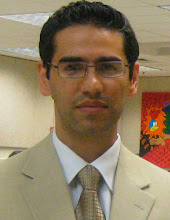A great article by Heshmat Tbarzadi on WSJ
What I See on the Frontline in Iran
Regime change is now our movement's rallying cry.
When massive numbers of Iranians took to the streets following the sham election of Mahmoud Ahmadinejad in June, the regime hoped to quash the protests with intimidation and force. It has failed. The latest evidence of the democratic movement's force? Student Day earlier this month.
The roots of Student Day go back to Dec. 7, 1953, when Iranian students protested the coup that ousted Prime Minister Mohammed Mossadegh. The Shah's regime responded by attacking Tehran's Polytechnic University, murdering three students.
Every year since, Iranian students have observed "16 Azar" (Dec. 7) to commemorate the three students killed by the Shah. But after the 1979 revolution—and with the blessing of the government—Student Day was turned into a useless, perfunctory occasion.
Yet in December 1991, students who believed in what they saw as the true ideals of the Islamic Republic began to once again use Student Day to protest against the regime's oppression. The government and its military branch of students—the student basij—reacted with violence.
Despite the regime's repression, as time passed, the importance of Student Day grew among student leaders—from the left to religious democrats to pro-Western democrats—even as they lived in constant fear of the government's ruthlessness. Many were repeatedly sent to prison where they were tortured.
I was one of those student leaders. In the regime's view, I was considered to be an architect of a student uprising on July 9, 1999, an uprising that was a true turning point in the movement for democracy. Students like me began to attack the regime itself, rather than simply calling for reform. And so I spent six years in the notorious Evin prison. Two of those years were in solitary confinement.
This year, I witnessed Student Day transformed into something bold and new. For the first time, regular citizens joined students in a common call for democracy and human rights.
Before Student Day this year, Qolam Hossein Mohseni Ejei, the public prosecutor and a religious leader, announced that he would be pro-active in preventing the usual Student Day protests. He followed through on his threat: Hundreds of students were arrested and harassed. And on Dec. 7, the basijis in civilian clothing confronted the students and the people.
In Enghelab Square, I saw a woman in her late 20s get kicked so hard in her spine that she flew through the air. On Ghods Street, near Tehran University, I saw another young woman as her head was pounded into a car by the basij. All the while, they screamed disgusting epithets like "whore" and worse.
Yet the movement only became more determined. More than 50 universities throughout the country, both private and government-run, joined in a historical display of resistance.
Many observers believed that the event was going to be the turning point for the democratic movement. If the government managed to crack down on the democrats, and if the planned protests did not come to fruition, then the government would be able to tie a rope around the neck of this movement, by making even more sweeping arrests of activists and suppressing opposition leaders like Mir Hossein Mousavi and Mehdi Karroubi.
However, if the regime was unsuccessful, it would become further weakened and isolated. And this is precisely what has happened.
Since Dec. 7, the movement has only become stronger, with protestors openly denouncing the Supreme Leader Ali Khamenei, challenging the entirety of the ruling establishment, and demanding the separation of religion and state. Among the protestors on Student Day was Faezeh Hashemi Rafsanjani, daughter of Ali Akbar Hashemi Rafsanjani, the second most powerful man in the ruling establishment.
As fissures within the ruling elite deepen, we will see what choices the government will make. Will the regime attempt to compromise with the leaders of the protest movement? Or will it escalate its violent crackdown during upcoming protest days?
One thing is certain: Dec. 7 proved that the movement for a free, democratic Iran is robust and only growing in strength. If the government continues to opt for violence, there very well may be another revolution in Iran. One side has to step down. And that side is the government—not the people.






